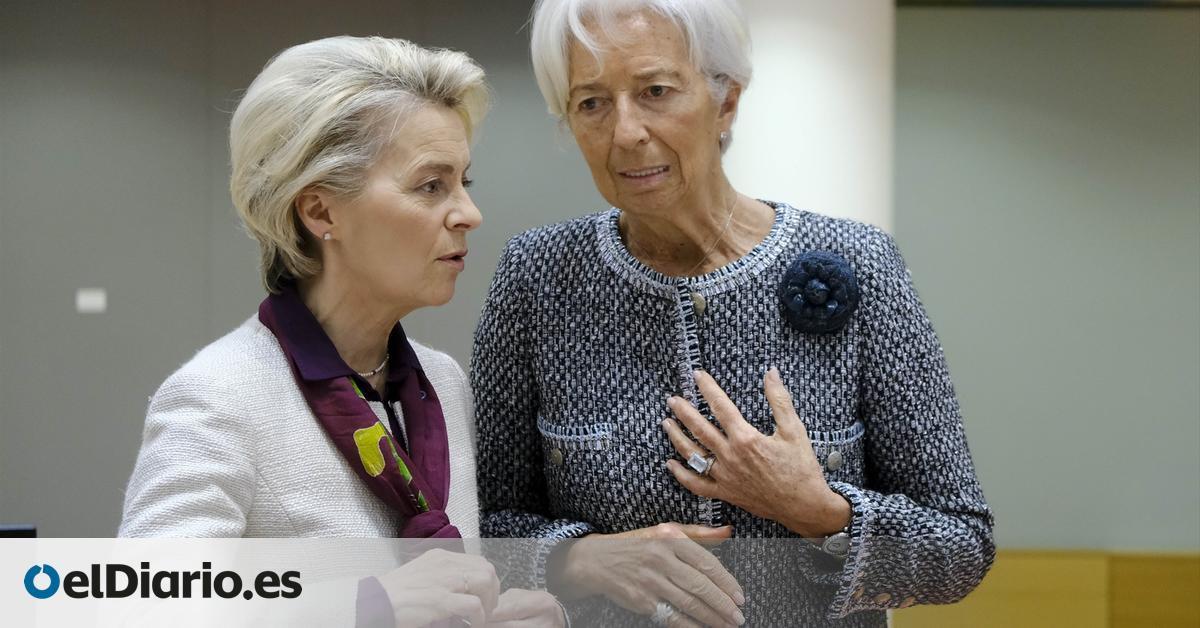
A new era has opened in the European Union (EU). And, therefore, in Spain. The increases in the interest rates of the European Central Bank (ECB) and the new fiscal rules threaten the social policies of the governments to fight against the impact of inflation and the consequences of the war in Ukraine. The combination of the increase in financing to fight against rising prices and the return to budgetary control rules to reduce debt tie the ‘hands’ of European executives to design measures that alleviate the damage suffered by the real income of families .
The IMF denies austerity to lower debt 15 years after the financial crisis
Further
“At the moment, the ECB [y también la Comisión Europea] they are asking governments to reduce their spending. In the current context, this is equivalent to asking for a recession”, says Jordi Schröder, a researcher at Positive Money Europe. “In the case of Spain: if in the last two quarters of 2022 the contribution of government spending to growth had been zero, the GDP (Gross Domestic Product) would have contracted,” he continues.
The point is that, indeed, the anti-crisis plans (tax cuts, transport discounts, gas caps…) have been softening the blow of the price increases, and also of the monetary policy strategy. Because, with the interest rate hikes, the ECB intends to reduce the consumption capacity of families, the investment capacity of companies and, of course, the State’s spending (which increases the interest bill on the public debt). Basically, the objective is to slow down the economy in general in order to contain inflation, despite the risk of recession and rising unemployment.
Judith Arnal, a researcher at the Elcano Royal Institute, points out that “the biggest problem that could arise” with this lack of coordination between the measures of the governments and the monetary policy of the ECB is that “an expansive fiscal policy counteracts the effects of the tightening of the monetary policy, thus forcing the central bank to raise rates above the level that would be optimal”. This scenario means more suffering and more inequality, as the poorest families, small and medium-sized companies that need financing, and the most over-indebted states, such as Spain or Italy, are always more vulnerable.
For his part, Víctor Alvargonzález, founding partner of Nextep Finance, emphasizes that “the worst thing is that monetary policy is not canceled entirely [con políticas fiscales expansivas]. For those who raise interest rates, but do not receive a subsidy, nor raise their salaries, nor give them public works for their companies… only the bad part remains. While those who receive support from the State in one way or another are less affected by the rise in interest rates on mortgage loans.
Less public spending or more rate hikes
In a recent speech, Isabel Schnabel, Germany’s voice on the ECB’s executive committee, argued that if governments do not commit to ‘responsible’ fiscal policies, the central bank will have to toughen up. [las condiciones de financiación] even more. “This is equivalent to saying either you trigger the recession or we will,” laments Jordi Schröder.
“It is recommended that fiscal policy comply with the principle of the ‘three T’: in English, measures targeted, temporary y tailored, that is, targeted, temporary and customized measures. Given that there are still inflationary pressures and that these affect, among other issues, food, it is appropriate that there continue to be targeted fiscal support for the most vulnerable groups. However, permanent and general support measures no longer seem pertinent and may make the work of monetary policy more difficult”, says Judith Arnal.
Schröder is more critical, insisting that “engineering a recession to deal with inflation is itself a highly dubious option, where the cure is worse than the disease. Doing that in the current situation, where price increases are clearly not driven by demand, is even worse.” Although he agrees that “fiscal policy must prioritize redistribution to help low-income households weather the storm and invest heavily in the green transition.”
Schnabel herself assures that “according to our most recent projections [del BCE]We don’t see a recession.” Of course, it warns that it is necessary to “analyze whether the banking turmoil [que han provocado las mismas subidas de tipos en Estados Unidos y en Suiza, con coletazos en la eurozona] They change something in that sense.” As he observes, “there are no particular signs of a weakening in economic developments.” And he concludes: “If we were approaching an acute financial crisis, of course we could not ignore it. Financial crises are ‘disinflationary’. We know that very well”.
change of era
Since 2020, with the rigid fiscal rules that marked the EU’s response to the 2008 financial crisis suspended, eurozone governments have acted with a fiscal freedom unknown in recent decades. Even with the support of common and historical stimulus packages, such as the Recovery Plan. “So far, we have had a good experience with the ‘Next Generation EU’ programme. That was a very important step”, Isabel Schnabel has come to admit.
The support of the ECB and the European Commission to increase public spending, the deficit and indebtedness, and attend to the needs that were not covered by the income of the states did not remain in the pandemic. It spread with the Russian invasion of the Ukraine. The Bank of Spain has calculated that the total public spending effort in the EU last year was 2%. And that, specifically, the anti-crisis package of the Government of our country subtracted 2.3 percentage points from inflation in 2022 and raised GDP by 1.1%.
Along the same lines, from the NGO EAPN they emphasize that when the State intervenes with the reinforcement of social protection, results are seen. Without the cushion of the ‘social shield’ of recent years, the drop in inequality to the lows prior to the blow of the financial crisis would not have been possible, they warn. “When they say that money is better in people’s pockets, it is not like that, not for those who have fewer resources,” underlines Juan Carlos Llano, whose analysis team at EAPN estimated that the protection measures prevented around 1 .5 million people fell into poverty with the pandemic.
But the inflation crisis that exacerbated the war is now entering another phase, of moderating price increases (or disinflation). “The ECB has a strong interest in a credible fiscal framework, which ensures debt sustainability in a growth-friendly, not pro-cyclical way. [es decir, que no ahonde en las recesiones y no favorezca las etapas de expansión] and enforceable”, added Schnabel, in an interview before the latest proposal from the European Commission was released on Wednesday.
A proposal for fiscal rules from 2024 on which the Ministry of Economic Affairs of Nadia Calviño highlights that “includes the paradigm shift that Spain and the Netherlands proposed last year, based on the importance of having a differentiated approach by country , adapted to future challenges and inspired by the governance model of recovery plans, in order to strengthen fiscal sustainability in a growth-friendly manner through commitments and incentives for investments and reforms”.
Virtually all the European institutions are insisting that the current situation cannot be compared with the debt crisis and the terrible social consequences of the austerity with which the European Commission, the ECB and the Monetary Fund responded by mandate International (IMF): unemployment, evictions…
Even the IMF has recently renounced what in economic jargon is known as “fiscal consolidation” as a method to reduce budgetary imbalances. “Cuts in public spending have negligible effects on average on debt [de los estados]”, the agency stated in a report. However, this Thursday, Calviño boasted that the Government of Spain is taking advantage of “the strong economic growth and job creation to reduce the deficit ratios as quickly as possible (the imbalance between expenses and income of a state) and of debt over GDP”.
“We are going to advance one year, to 2024, the reduction of the deficit to 3% of GDP. This is important news that confirms our government’s commitment to fiscal responsibility, to absorbing the blow caused by the pandemic and to sustainable growth,” explained the economic vice president.
Calm in financial markets
Spain’s deficit remained at 4.8% in 2022 with respect to GDP, compared to 8% in Italy or 4.7% in France. In 2020 it reached 10.1% in our country. The International Monetary Fund expects that in 2023 it will continue at 3.5%, above the path of the Government and the objective maintained by the proposal for the new fiscal rules of the European Commission, although according to the Brussels proposal, it will be possible to persecute medium term.
Ernest Urtasun, economist at En Comú Podem and vice president of the Green Group in the European Parliament, considers that the proposal “avoids another round of austerity, but the countries will not have the margin [fiscal] enough to guarantee the ecological transition”. He also recalled that “the parameters [objetivos] The 3% deficit and 60% with respect to GDP do not make any sense, but there is a difficulty in eliminating them, which is that they are part of the Maastricht Treaty [suprimirlos exigiría una reforma profunda]”. “The positive thing” is that now it is promoted that these objectives will be tried to be achieved “in the long term”, she concluded in an interview on RNE.
Indebtedness, the debt to GDP ratio, closed last year at 113% in Spain, where it reached 120.4% in 2020. In France it is at similar figures. In Italy, at 144%. Indebtedness is the first indicator that is observed to measure the financial sustainability of a country. It depends on both the numerator (debt) and the denominator (GDP). For this reason, although the total public debt (in volume) continues to increase while there is a deficit, the indebtedness decreases due to economic growth
Another way of measuring the debt burden is by comparing interest spending with state revenue, and in this picture Spain comes off worse than Germany or France, but much better than Italy.
It can be seen that the increase has also been contained in our country in the last two years, despite the increases in the official interest rates of the ECB to fight against inflation. For the moment, the situation in the financial markets does not reflect tension. Above all, due to the flexibility that the central bank has shown to address the threat of “fragmentation”. In other words, the threat that a country will suddenly suffer a much higher financing cost than the rest.
The voices that are uncomfortable with this ‘tranquility’, which come above all from the most liberal positions in Germany (such as that of Finance Minister Christian Lindner) and other orthodox poles of the European Commission, raise the risk that the most over-indebted economies will not stop being dependent on high deficits to grow. Therefore, they insist on rigid control. Even if that means ignoring the need to face large investments to achieve the green transition or alleviate the damage of inflation.
Source: www.eldiario.es

